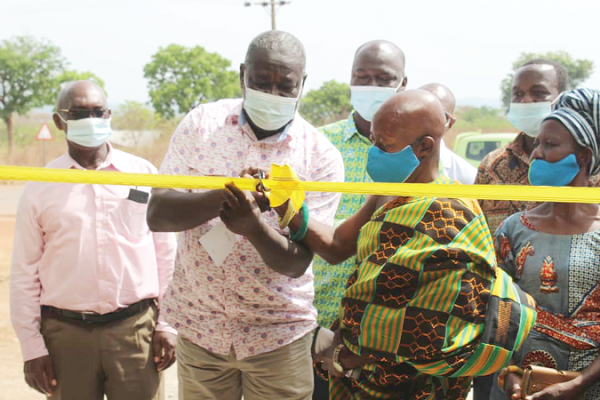The Bui Power Authority (BPA) has inaugurated six new business modules under its Livelihood Enhancement Programme (LEP) being implemented to improve the socio-economic wellbeing of the persons affected by the construction of the Bui Hydroelectric project.
The six business modules, which will cost GH¢1.08 million, will benefit 237 persons in the areas of tractor agricultural mechanisation, artisanal programme, fish raising, fishing and fish mongering, skills training and mat bag making.
Forty-nine of the beneficiaries are engaged in tractor and garage services, 18 artisans, 30 fish raisers, 24 fishing and fish mongers, 36 skills training and 80 mat bag producers.
The six new modules will bring to 409 the number of persons benefitting from the LEP.
In all, 815 eligible persons are expected to benefit from the entire project, which will cost GH¢4 million.
Cost
The tractor agricultural mechanisation module comes with a tractor, together with ploughing add-ons, a garage with an attendant’s office, as well as seed capital of GH¢295,500 to the group members.
For the artisanal programmes, it is made up of the procurement of enhanced tools and equipment, construction of shops with the connection of electricity, all at a cost of GH¢158,624.
With regard to the fish raising, which will cost GH¢218,189, it comes with 10 aquaponic fish ponds, stocking of fingerlings, budget for re-stocking after first harvest, operational items and training, while the mat bag making, which include the provision of start-up tools and materials, costs GH¢128,320.
The GH¢162, 228.44 fishing and fish mongering module comprises the procurement of canoes and Chorkor smokers and the provision of startup tools and materials, while the skills training module, consisting of the procurement of training items and settlement of training, examination and graduation fees to the trainers, will cost GH¢119,643.
![]()
Communities
The beneficiaries are settlers from seven communities with a total population of about 1, 216 persons who were affected by the construction of the Bui Hydroelectric project.
The communities are Brewohodi, Lucene, Dam Site, Agbekikuro, Bui, Bator Akanyakrom and Dokokyina.
Farming and fishing were identified as the main sources of livelihood for the residents.
Expectation
Speaking to the media after the inauguration of the modules last Friday, the Director of General Services of the BPA, Mr Salifu Wumbila, said the BPA was expecting that within the next three years, the businesses of the beneficiaries would flourish, with improvement in their living conditions.
He advised them to see the items presented to them as their own, not those of the authority, and urged them to take good care of the tools.
Mr Wumbila explained that the BPA would make its staff available to the business modules for monitoring of the beneficiaries for the next three years to ensure that they were well established.
"The staff will continue to advise them on how to manage and save their incomes, when to do maintenance works or purchases of new tools and equipment to replace old ones," he stated.
Mr Wumbila expressed the hope that with a mentor attached to them, they would not run the businesses down even after the exit of the mentors.
Restoration programme
In 2019, the BPA decided to develop business modules in a structured restoration programme to improve the lives of the persons affected by the hydroelectric project.
Seventeen business modules were initially developed, with operational requirements and approaches.
The implementation approach had been to constitute the 816 eligible persons into groups under each business module and resource them with the required working tools and equipment, personal protective equipment (PPE) and facilities which would fully set them up to undertake their respective businesses.
The groups included aquaponics fishing, sanitation, fumigation, weeding, landscaping, fire control, lawn maintenance, cleaning services, warehouse maintenance and event and entertainment management.
The BPA automatically subscribes to and extends service contracts to such groups, while other businesses whose services are not required by the authority in immediate term receives patronage from the authority as and when their services are needed.
Lack of equipment
Some of the beneficiaries, particularly the artisanal group, told the Daily Graphic that they had acquired various skills such as carpentry and leather work, auto mechanics, electricals, glass work, plumbing and welding, but lacked tools and equipment to operate.
According to them, the tools had come at the right time and expressed the hope that the various forms of support they had received from the BPA would help them earn decent incomes in their respective communities.
They thanked the authority and the leaders in the community for championing the development of the community through empowering community members, particularly the youth, and pledged to work hard for the development of their communities.

